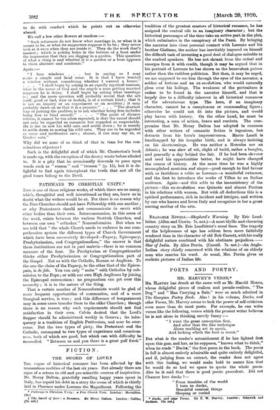FICTION.
THE SWORD OF LOVE4
Tug vogue of historical romance has been affected by the tremendous realities of the last six years. But already there are signs of a return to old and pre-scientific sources of inspiration. Mr. Moray Dalton, gratefully recalling happy years spent in Italy, has repaid his debt in a, story the scene of which is chiefly laid in Florence under Lorenzo the Magnificent. Following the • Pathways to Christian Unity : a Pree Church View. London: Macmillan. [6a.1 t The Sword of Love a Ramascs, By Moray Dalton. London : Collins, Us, wt.] tradition of the greatest masters of historical romance, he has assigned the central role to an imaginary character ; but the historical personages of the time take an active part in the plot, which culminates in the conspiracy of the Pazzi. By bringing the narrator into close personal contact with Lorenzo and his brother Giuliano, the author has inevitably imposed on himself the difficult task of inventing a good deal of dialogue suitable to the exalted speakers. He has not shrunk from the ordeal and emerges from it with credit, though it may be argued that in his portrait of Lorenzo he has shown us the benevolent patron rather than the ruthless politician. But then, it may be urged, we are supposed to see him through the eyes of the narrator, a soldier of fortune and an ex-condottiere, who would naturally gloss over his failings. The weakness of the portraiture is rather to be found in the narrator himself, and that is largely due to a difficulty inherent in all historical romances of the adventurous type. The hero, if an imaginary character, cannot be a conspicuous or commanding figure ; otherwise he would not fit into the picture, and would play havoc with history. On the other hand, he must be interesting, a man of action, brave and resolute. The com- promise that Mr. Moray Dalton has adopted in common with other writers of romantic fiction is ingenious, but detracts from his hero's impressiveness. Marco Landi is handicapped by his irregular birth, and is always insisting on his shortcomings. He was neither a Hercules nor an Adonis ; he was slow of wit, slight of build, rather a bungler, and generally a day behind the fair. If he had been cleverer and used his opportunities better, he might have changed the course of history. At the same time he was a highly accomplished musician and singer—good enough to find favour with so fastidious a critic as Lorenzo—a wonderful swimmer, and the first to introduce the works of Villon to an Italian audience. Again—and this adds to the inconsistency of the picture—this ex-condottiere was Quixotic and almost Puritan in his relations with women. But with all deductions this is a spirited performance, rich in incident and intrigue, and written by one who knows and loves Italy and recognizes in her a great nursing mother of the arts.




































 Previous page
Previous page